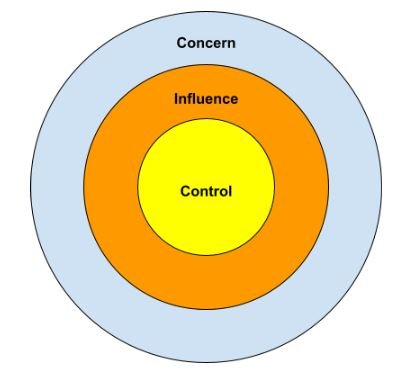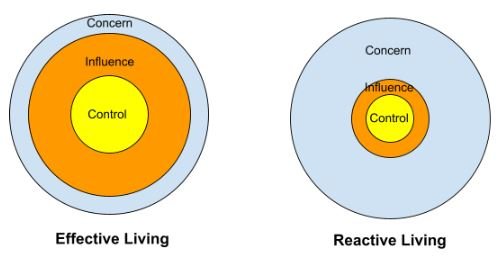Your Circle of Influence
Do you ever find yourself spending your valuable time thinking about, obsessing over, or getting emotionally engaged with things you have very little or no influence over? If you do, you are probably not using your time, energy, and creative talents as effectively as you could.
Steven Covey, in his book, The Seven Habits of Highly Effective People, talks about Effective vs. Reactive behaviors and defines something called the “Circle of Concern/Influence” to help explain the distinctions.
We all have a wide range of things we care about – personal things such as our health, our children, our job, our marriage and social issues like the global COVID pandemic, racial inequality, crime, the ever widening income gap, the state of the economy, the state of our government, world strife, and climate change to name a few of the most “popular” ones today.
We could separate all these things into one of the three areas shown in the above diagram. It is clear that there are some things over which we have quite a bit of control (our thoughts, our behaviors and actions), things we can’t really control but may influence (our children, our work environment, causes we care about, and organizations we belong to, etc.), and things over which we have no control or influence whatsoever (see the list above).
Effective people (those who positively create what they want in their lives) focus their efforts on their circles of Control and Influence. They work on things that they can do something about. The nature of their energy is positive, enlarging, magnifying and this causes their circles of Influence/Control to increase.
Reactive people on the other hand often focus their thoughts, emotions, and efforts outside of their circles of Control and Influence. They focus on the faults of their spouse, the past problems in their relationships, what other people think or how they behave, or the alarming state of the world as described above. As Covey says, “This focus results in blaming and accusations, reactive language, and increased feelings of victimization. The negative energy created by this focus, combined with neglect in areas they could actually do something about, causes their circle of influence to shrink.”
In today’s chaotic and scary world, we are perpetually confronted with the challenge of being connected (news, social media, conversation) while not becoming overwhelmed by all the fear and negativity that comes along with that connection. We all need to strike a personal balance between engaging with what is going on and protecting our well-being.
How do we do this?
One strategy is to be disciplined about our circles of Influence and Control. We can, at the same time, be open to what is going on in the world and choose very carefully where we engage with and focus our time and energy in response to that knowledge.
Try this exercise and see where you come out. Write down the top 20 things that you spend your time thinking about, worrying about, or actually doing things about. Put each one into one of the three areas of the Influence circle. How did you come out? Are many of the things that you spend time on outside of your circles of control or influence? If so, you do have the agency to change the ratio and spend more of your time in areas where you can have an impact.

